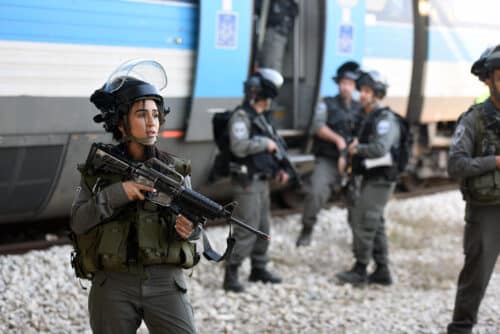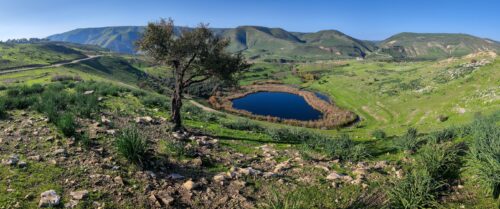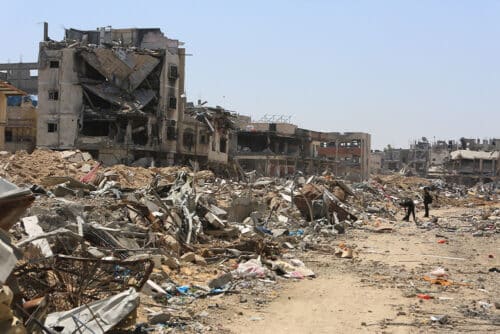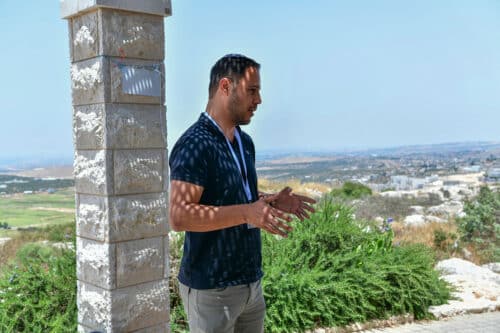As part of the activities of the Israel Defense and Security Forum (IDSF), the Research Department is conducting a continuous survey within Israeli society every quarter, concerning social, Zionism and security issues. The results of the continuous survey are presented regularly to the media and to the decision makers as “the IDSF Index”.
The survey, which was conducted in the first quarter of 2022, dealt with a variety of security issues, and we will summarize the first part in this article, which dealt with concepts concerning Arab-Israelis on security issues and the Jewish people’s right to a sovereign state in Israel.
The survey was conducted by our Research Department, with the statistical support of Dr. Haggai Elkayam. The sample was taken from 1,068 respondents among the adult population in Israel that uses the Internet. For the Jewish sample (808 respondents) the sample’s maximum margin for error is ±3.45% with a probability of 95%; For the Arab sample (260 respondents) the sample’s maximum margin for error is ±6.80% with a probability of 95%.
Not Historically, Not Religiously, Not Legally: We Have No Right to Exist Here
The first and most basic issue we examined was what Israelis thought of the source of our right to a Jewish sovereign state in Israel.
The Jewish majority in the State of Israel (79%) believes that the Jewish people have a basic right to a Jewish and democratic state in the Land of Israel, which supersedes the rights of other nations. In addition, an overwhelming majority (91%) believes that the Jewish people have a historical right to a sovereign state in the Land of Israel. 72% believe that the Jewish people have a religious right to a sovereign state in the Land of Israel while 90% believe that the Jewish people have a legal-international right to a Jewish state in the Land of Israel.
The picture that emerges among Arab-Israelis is completely different, which is worrisome. No matter what angle we used to ask this question, we received the same disturbing answer: most Israeli-Arabs believe that the Jewish state has no right to exist in the Land of Israel. Most Israeli-Arabs do not agree with statements over our right to a Jewish state in Israel: not historically, not religiously and not legally.
These figures should be very worrisome, both to the Jewish majority and to the Arab minority that does believe in the Jewish people’s right to exist in the Land of Israel. These figures should be a warning sign to the decision makers with regards to internal security, and particularly with regards to a situation in which an assault from without is combined with violent protests of Israeli Arabs from within. Without sovereignty and governance, which need to be expressed in the rapid imposition of order when violent riots break out, Israel’s security shall be significantly impaired. What are the measures that can be implemented in order to restore order, in the opinion of the Israeli public? We also asked this question and will elaborate upon it in the next article in the series.
Violent rioting of Israeli-Arabs: An economic or nationalistic background? The answer is conclusive
Another issue that was examined in this survey is what sends some Israeli-Arabs into the streets in armed demonstrations, calls for violence against Jews, carrying out deadly terrorist attacks in Jewish cities and violent riots in mixed cities as we witnessed in May of the previous year.
One claim that has received a great deal of traction in the media is that the background for it is socioeconomic discrimination and not the nationalist-religious issue. Our Research Department examined this in the field, and the figures that emerge from the survey are unambiguous: the background for the riots is nationalist and religious.
An overwhelming majority (79%) of the Israeli population believes that the reasons for the riots is the nationalist background or identification with the Palestinian struggle over the Temple Mount, and that only 12% believe the reason to have a socioeconomic background (9% responded “I don’t know”). When the answers are segmented according to Jewish and Arab respondents, we discovered that only 8% of the Jews believed that the background for the riots was socio economic, but that even among Arab-Israelis the answer was unambiguous: only 22% believe that the background is socioeconomic.
What happens in a war between Israel and its enemies?
The third issue we chose to clarify is an issue that is not asked in other surveys, and which directly focuses upon the practical aspect: What happens in a war of survival between Israel and one or more of the Arab countries – who will the Israeli-Arabs support?
The answer should engender a great deal of concern: only 9% of the total population in Israel believe that most Israeli-Arabs will support the State of Israel. When segmenting according to Jewish and Arab respondents, we discovered that only 4% of the Jews in Israel believe that most Israeli-Arabs will support the State of Israel during a war of survival, and only 26% of the Arabs believe that most Israeli Arabs will support the state of Israel during a war of survival. This is the reality, and we should recognize it.
Another angle we examined, concerning a future war that would jeopardize the existence of Israel, is how the citizens would react to a threat. When Russia invaded Ukraine at the end of February 2022, many Ukrainian citizens were rallied to the flag and fought for their land against the power from the east. Would Israel citizens mobilize for the war effort in every way possible when an enemy nation invaded Israel? Here, the data is encouraging: 86% of the Jews responded in the affirmative.
Brigadier General Amir Avivi: ” on the one hand it’s surprising, on the other hand it was already known”
Brigadier General (res.) Amir Avivi, Director-General and Founder of the IDSF, addressed the survey and its findings in various media outlets, and now summarizes his feelings: “The IDSF is building a long-term index that pertains to aspects related to governance, internal security and personal security. The findings of the survey are on the one hand surprising in their severity and on the other hand reflects emerging trends that we have known about for some time.”
Regarding the figure according to which 75% of Israeli-Arabs do not recognize the Jews’ right to a sovereign state in the Land of Israel, Avivi indicated that “This figure is consistent with the voting patterns of the Arab population, which votes for Islamist nationalist parties that declare that they do not recognize the Jewish state, but rather seek to create a country of all its citizens.”
Regarding the worrisome figure of the Arab-Israelis’ very low support during a war of survival, Avivi said: “the figures reflect processes that have been occurring in the Palestinian society: on one end of the spectrum there are Israelis-Arab who have integrated into society, on the other end there are activists prepared to act against the state and in between there is the majority that is ‘sitting on the fence’, and will decide who they will support in accordance with their estimation of the power of the state and its capabilities. For this exact reason, the strength and deterrent power of the State of Israel are of the greatest significance.”
We may summarize and say that all the data of the IDSF Index survey point to an unambiguous conclusion: We are burying our head in the sand, which is dangerous. The IDSF is acting to change the security concept of Israel to one that recognizes reality, is current and ensures that the State of Israel is prepared to defend itself on its own, both internally and externally, so that it can remain a Jewish and democratic state for generations to come. This includes the IDSF’s current work to establish a National Guard and to assist in recruiting these volunteers.









